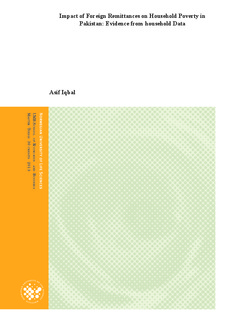| dc.contributor.author | Iqbal, Asif | |
| dc.date.accessioned | 2013-08-08T12:26:22Z | |
| dc.date.available | 2013-08-08T12:26:22Z | |
| dc.date.copyright | 2013 | |
| dc.date.issued | 2013-08-08 | |
| dc.identifier.uri | http://hdl.handle.net/11250/187480 | |
| dc.description.abstract | The impact of foreign remittances on household poverty in Pakistan using Household Integrated
Economic Survey of Pakistan (HIES) data for 2007-08 are studied by employing Propensity
Score Matching (PSM) method. Average treatment effect on treated for the impact assessment of
foreign remittances on per capita income and poverty levels in Pakistan are estimated.
Results of average treatment effect estimates suggest that remittances enhance the per capita
income by about 45 percent when compared to the per capita income of the households that do
not receive remittances. This percentage is even higher at 64 percent for the case of urban
households.
Results also indicate that for the complete sample, remittances reduce the probability of
households getting under the poverty line by 30 percent. This percentage is higher for the rural
households, 36 percent, compared to the rural households at 23 percent.
Our impact assessment results conclude that keeping other factors constant, remittances boost up
the per capita income and reduce the poverty of the households not only for complete sample but
also for the households from the rural and urban areas separately. To reduce poverty, the
Government should facilitate and encourage expatriate Pakistanis in sending remittances to their
home country. Issuance of Remittance bonds seems to be an appropriate step in this regard.
Increase in remittances will not only help in achieving macroeconomic stability, but also support
the government initiatives in reducing poverty levels. | no_NO |
| dc.language.iso | eng | no_NO |
| dc.publisher | Norwegian University of Life Sciences, Ås | |
| dc.subject | remittances | no_NO |
| dc.subject | poverty | no_NO |
| dc.title | Impact of foreign remittances on household poverty in Pakistan : evidence from household data | no_NO |
| dc.type | Master thesis | no_NO |
| dc.subject.nsi | VDP::Social science: 200::Economics: 210::Economics: 212 | no_NO |
| dc.source.pagenumber | 27 | no_NO |
